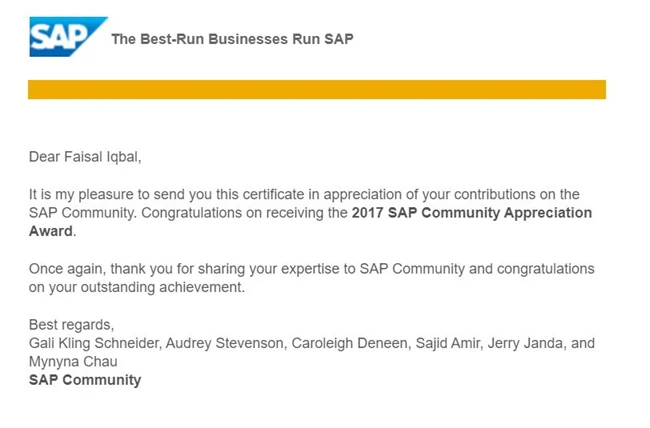Eursap's Ask-the-SAP-Expert: Faisal Iqbal, SAP SuccessFactors Consultant and Trainer
Eursap's Ask-the-SAP-Expert: Faisal Iqbal, SAP SuccessFactors Consultant and Trainer
Eursap’s Ask-the-SAP-Expert article is a feature designed to give you up-to-date information on the latest SAP news, featuring key thought leaders in the SAP space, as well as regular interviews with the best SAP consultants in the business.
This month, we feature Faisal Iqbal, SAP SuccessFactors expert, freelance consultant, and highly respected guru in the international SAP community, having worked in the Middle East, Pakistan and Indonesia.

Hi Faisal, firstly thank you for taking the time out of your busy schedule to talk to us. Can you tell our readers a little bit about yourself?
Hi Jon, it’s my pleasure. I was born and bred in Pakistan, however, for the last sixteen years I’ve been living abroad. Prior to moving to Indonesia, two years ago, I lived and worked in Saudi Arabia. Aiming to be what they call a digital nomad, currently I’m working with some foreign businesses as an independent SAP Consultant. I’m a family-oriented person and love staying at home most of the time. Since I have left corporate life, I feel I’m getting closer to my objective of maintaining that balance.
And how did you first get into the world of SAP?
I started my professional life at an SAP implementation project. At the end of 2001, to earn my MBA degree from UIMS, I joined Siemens for a two-month internship. While I was still an intern, FABS project (then known as PIFRA) kicked-off. It required some fresh graduates to assist the senior consultants, and I was there at the right time, hence I was offered a job. The project’s German Project Manager told me the benefits of becoming an SAP consultant and I accepted the position. It’s how my SAP career started, and it was to support HR, mainly payroll. It Takes Mules And Technology To Deliver Payroll At The Top Of The World describes the project narrative in detail. Since then, I have seen many transitions, from R/3 4.6c to cloud HRIS.
And what about now? You clearly love interacting with people - what does a normal day in this Covid-19 world look like for you?
Having worked with people from various backgrounds I have learned many things, and I believe it’s one of the best ways to improve your way of thinking. During the pandemic I feel many more have joined LinkedIn to connect with the outside world. It has also given me a chance to get in touch with a number of SAP professionals. As I work with global clients now, there’s no fixed schedule which I could follow on a daily basis. However, in terms of activities, I do have slots for each and every day. I spend most time at my home-based office.

Can you speak about some of the challenges facing contractors in today’s world?
Well, there are many, but let’s look at the financial aspect which is often misunderstood by those who haven’t tried contracting yet. Contractors don’t have a fixed income, and unlike full-time employees, are not eligible for certain benefits. Similarly, they don’t receive the money for their work regularly, as it is often linked to the payment terms between them and their clients which vary from one customer to another. Contractors do sometimes get premium rates, but again it’s not always the case. And even if you are paid better at one project, you have to think of covering your expenses for rainy days. Beyond commercial aspects, there are also many other things a contractor has to take care of.
However, the bright side of facing such challenges is you learn to deal with them better. And I would say it’s similar to other types of works too. As an employee or entrepreneur, you always have to be active to enjoy the rewards associated with the profession you are in, and the working model you follow.
If I was an SAP expert, wondering whether to take the leap into freelance consulting, what are the factors you would recommend that I think about?
Freelancing has its own set of challenges and rewards, and it’s good to know them before one chooses to work as a freelancer. One of them is you often have to perform different roles at a time. While you’re on a project, worried about deadlines and quality, you also have to keep exploring new avenues, developing business, and handling finances, (and therefore wearing hats of a consultant, salesman, finance manager). The assignments are relatively small, and sometimes there are gaps between two assignments. Reputation plays a vital role in getting your next gig, and that takes time to build. Your one happy customer may recommend you to another, or you may continue working with them whenever there’s such work.
“Don’t compare yourself with others” is what I would advise. It’s learned over time, after many trials and failures. What works for one, may not for another. Each person has his/her own unique circumstances. I always ask them to have a SWOT analysis, looking at your own Strengths and Weaknesses in light of Opportunities and Threats within your target market. I have written a detailed blog describing Freelancing and Freedom which may somehow help.
The HR area in SAP is one which has changed very quickly in recent years, with the 2012 acquisition of SuccessFactors, through the cloud journey, right up to Human Experience Management (HXM) Suite. How do you keep yourself up to date in this environment, while still leaving time to work?
It's an ongoing effort, and isn’t always easy. The approach I usually follow is to use my free time between projects to learn new things. I was focussed on SAP HR/HCM on-premise solutions for the first 15 years of my career, and at my last role, while supporting SuccessFactors Implementation as an OCM (Organizational Change Management) Consultant, I started to learn about the cloud solution. I started with a MOOC (Massive Open Online Course), and I recommend others who are new to the HXM suite do the same. How I benefited from openSAP course, some tips to help you in your learning describes it in good-enough detail. The other great resources to stay up-to-date are following SMEs, reading their blogs/articles at different forums, which you can do anytime.
We can’t help but notice that you have received a ton of certifications in your area. What is the motivation to keep getting certified? Do you see it as an additional benefit which your customers can gain from?
Well, the certifications I have are cross-functional, SAP and IT. I earned those qualifications (such as TOGAF, ITIL, and PROSCI) in the last few years, as part of IDP (Individual Development Plan) at my last organisation. The SuccessFactors certifications, however, were to upgrade my skills from on-premise to in-cloud Solutions for HR. I took two certifications three years ago: Employee Central and Performance & Goals Management. I continued to take delta assessments to keep my certified associate status valid, hoping to transition someday from HCM to HXM, which I finally did. To deliver SuccessFactors Projects, a consultant is required to have the modular certification, and therefore it’s beneficial.
Your partnership with MSITEK looks to be a really fruitful one. Can you give us an insight into the kind of work you do for them?
It definitely is. The purpose of partnering with them was to leverage each other’s strengths and serve the market better. I have delivered various SAP Academy Training courses (including HRSF1, THR80, THR81, THR82) through the SAP Education Partner to various corporates in different regions. It’s a great experience working with the team, and we are also working together on some potential consulting opportunities too.
You’ve also been very active in sharing your knowledge, either on LinkedIn, various blogs and even with your own eBook – can you tell us about that?
I wrote my first blog at SAP Community 10 years ago (when it was called SCN) on the advice of a former colleague. According to him, ‘written communication’ was my hidden strength. I didn’t believe it. Nonetheless I continued writing, on the SCN forum and on a few other forums too until I started to enjoy it. I learned a lesson – the more you write, the clearer you become. Now if someone asks me for a suggestion I tell them the same – quantity will lead you to the quality. Writing my first eBook, on SAP HCM Organizational Management, let me experience & learn the process of sharing knowledge in another form. I hope someday I’ll write another book too.
You were awarded the SAP Community Appreciation Award a few years ago for your contribution to the SAP community. How did that come about?
That was considered a great achievement by many of my colleagues who nominated and voted for me for my contributions to the SAP Community. Behind it was six years of writing blogs and answering questions on the forum. It’s an honour and I appreciate the support I received from many. I still have the email sent in September 2017, sending me the certificate.

And how important are professional sites like LinkedIn to your work?
Very important! I landed my last full-time job (2015-2016) through LinkedIn. I started using it very actively two years ago, and during this time it has helped me with getting to know and connect with many SAP professionals. If I face a problem, I always get instant support from them through this great site. Similarly, it has allowed me to help many others. It’s also a great resource for learning new things, such as market trends, new opportunities etc.
What do you see the future holding for you in the SAP space? Can you see yourself doing more on the training side of things or on the consulting side?
I am trying to build my profile as a trainer and trying to expand my reach. I’m working with SAP Education Partners to deliver training courses to global clients. I believe many customers who are transitioning to SuccessFactors, and partners who are helping them, need help in this space for project team orientation, user readiness, and solution administration training. As an SAP Authorized Academy Trainer, who has delivered such courses, I see myself doing more on the training side of things.
Something we always ask our experts - what advice would you have for new SAP consultants just starting out or established SAP consultants?
In simple words I call it “Know and Grow, Share and Shine”. No matter at what stage of your career you are at, don’t stop learning. It’s through continuous learning that you can stay relevant in the market. And when you share your knowledge, you basically demonstrate your skills and build reputation as an expert. There are a number of forums for learning and sharing insights, including LinkedIn and SAP Community. I recommend both to be used wisely.
As for the future of SAP, we often can see the direction of travel by looking at recent events. Have you seen a surge in customers moving to the cloud for their HR systems?
Yes, lately, and as it was anticipated last year, the market is changing. Traditional HR processes are being replaced by new practices which have caused customers to turn to cloud HR systems. SAP, as has always been the case, was quick to respond to the market needs. Its SuccessFactors Solutions support the recent process changes which has gained customers’ trust. We are hoping to see more and more projects coming in the next few months, which is also good news for consultants who are specialised in the solutions to help customers with HR business transformation.